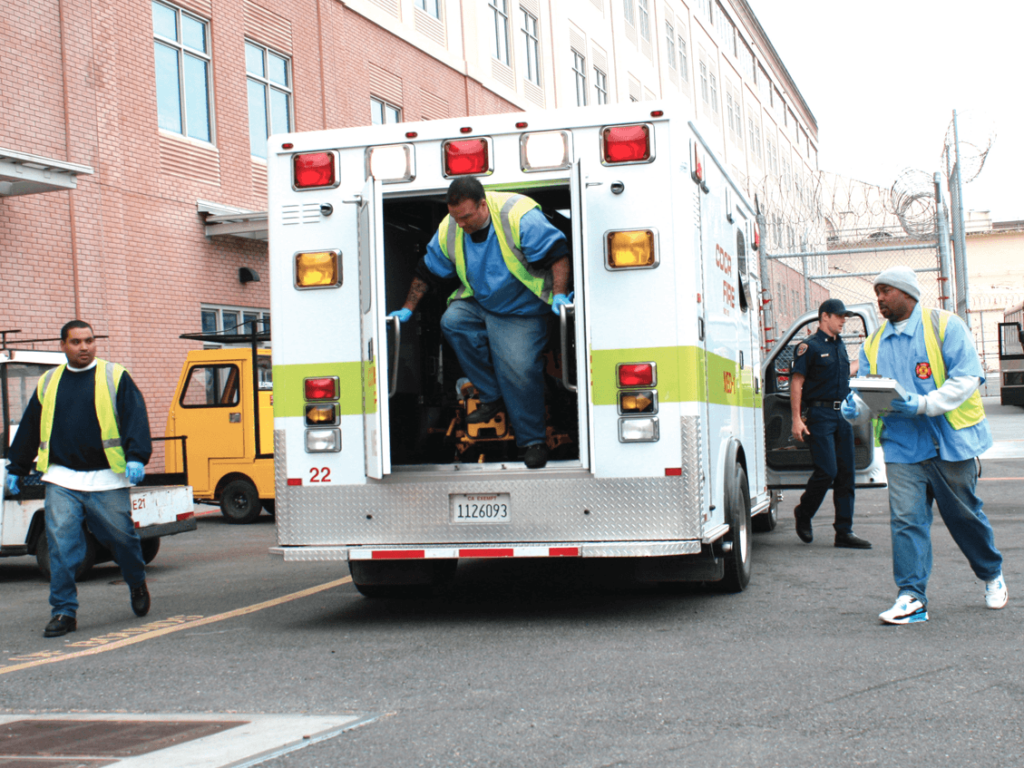
Residents voiced their concerns to Transportation Department staff about appointment cancellations, wearing restraints, long wait times, and feelings of mistreatment when traveling to outside hospitals.
Peer support specialist Michael Moore narrated the town hall discussion, which included around 30 residents, Dr. Garrigan, Nurse Busby, and Sergeant A.J. Perez.
Incarcerated Peer Support Specialist Tony Trinidad said he has encountered elderly residents with marks on their arms. He asked if there are resources available to elderly people who bruise from trips, falls, or bumping against things in their cell.
Sgt. Perez answered the question by saying the decision to offer padding to a person has to be a team decision.
“A lot of older people bruise easily,” said Perez. “First, there has to be a need for requesting padding. It also needs to be a collaborative decision between the resident, doctor, and the medical staff.”
Residents shared personal experiences, including feeling a lack of communication from staff when appointments are canceled and wearing leg and arm restraints during examinations.
Resident Laruen said he is concerned about getting a proper leg examination while having to wear leg and arm restraints. He asked if there are procedures in place for removing the restraints during these exams.
Another resident added to the question by asking, “If a [patient] asks their doctor to order the restraints to be removed, would that be possible?”
Sgt. Perez said officers transporting patients to and from medical visits are there to maintain the safety of the community, staff, residents, and, ultimately, they are there to follow procedures put in place to accomplish that safety.
“If a doctor tells us they need to remove a persons’ restraints to examine the leg or arm, we will do that,” said Perez. “We communicate with the same doctors and if you’re coming from San Quentin, those doctors know what they can and cannot do,” Perez said about the long-standing procedures and guidelines.
Peer Support Specialist Richard Fernandez said frail patients who undergo procedures like chemotherapy complain about their hands being cuffed and ask if the cuffs were necessary, even though the patient’s strength is minimal during these types of procedures.
Dr. Garrigan said medical staff have discussions ahead of time as to whether a resident needs a medical bed or wheelchair.
“Those determinations are made before a patient is taken to an outside appointment,” Garrigan said.
Resident Paul Hinojosa asked if it was okay to wear shower shoes to an outside appointment when a person has a swollen foot.
Sgt. Perez said that residents could wear state-issued footwear, including work boots, the black shoes issued when a person arrives to prison, and orthopedic shoes, which are also state issued.
“Shower shoes are stateissued and you can wear them, but if your foot is swollen, we can make accommodations,” Perez said.
Dr. Garrigan noted that residents could fill out an 1824 form, which will allow them to seek reasonable accommodation.
Toward the end of the town hall, the conversation focused on residents feeling there were long periods of waiting time and that appointment cancellations were not communicated to them from administration or medical staff.
One resident talked about having lower back pain and asked why it was that getting consultations took so long.
Dr. Garrigan said a few surgeons at Highland Hospital used to follow the progress of San Quentin patients, but they no longer have that staffing capacity.
“There were three or four surgeons following our patients. When they left, the remaining surgeons went into triage mode,” said Garrigan.
Resident Angie Gordon said that she has had several surgery cancellations, without her knowing. She said more communication is needed between facility staff and incarcerated persons. “There doesn’t seem to be any effort to interface with incarcerated people,” said Gordon.
As the town hall started to wind down, Dr. Garrigan said that she wanted to conduct another town hall in the future with a larger group to answer questions from residents.
Resident Moore agreed, saying “During this town hall, there were more concerns about communication between residents and their primary care doctor, so I believe we should have another one to address communication and invite nurses and doctors.”